General, Sir John Monash, Personal Files Book 21, 25 November - 31 December 1918 - Part 6
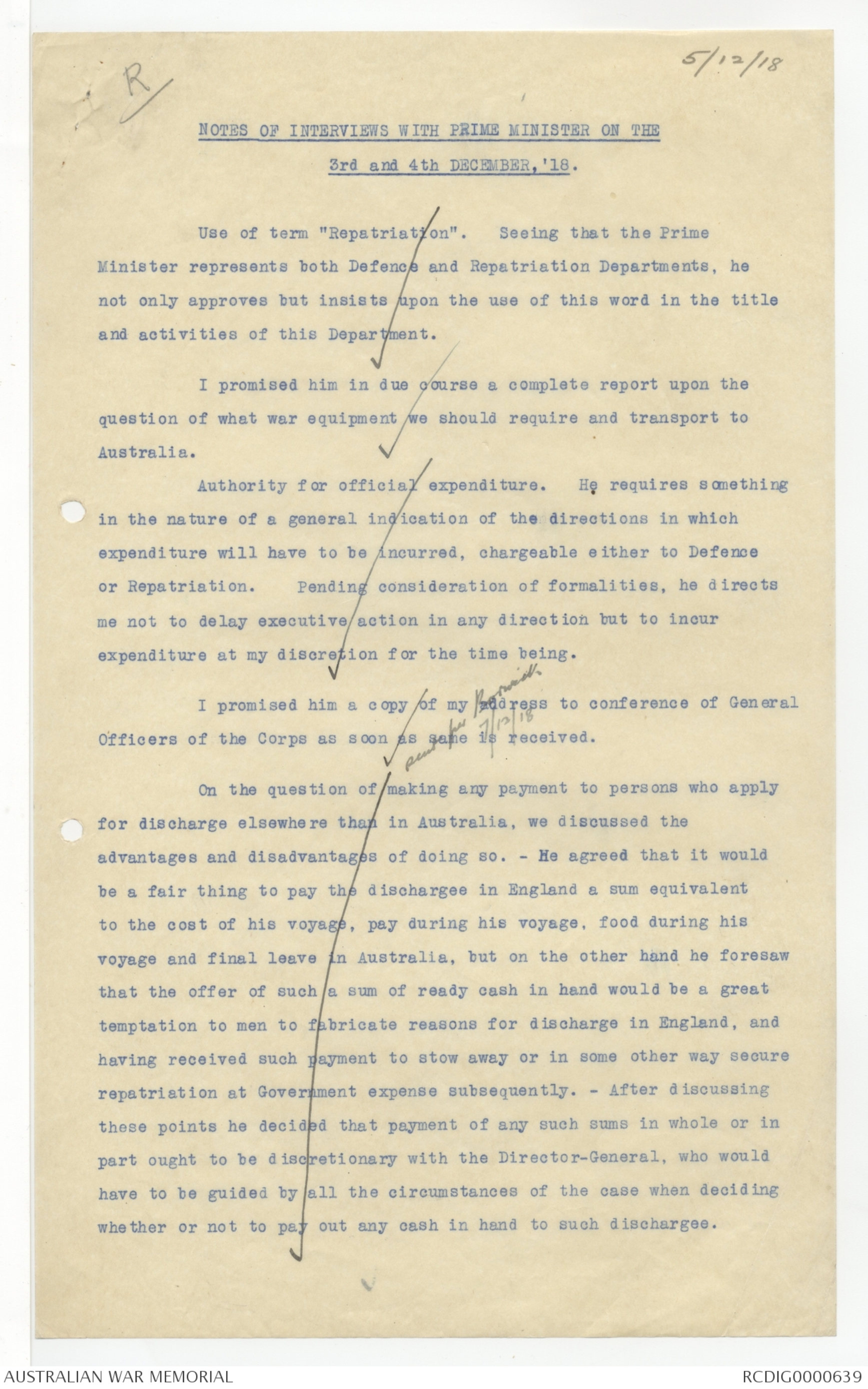
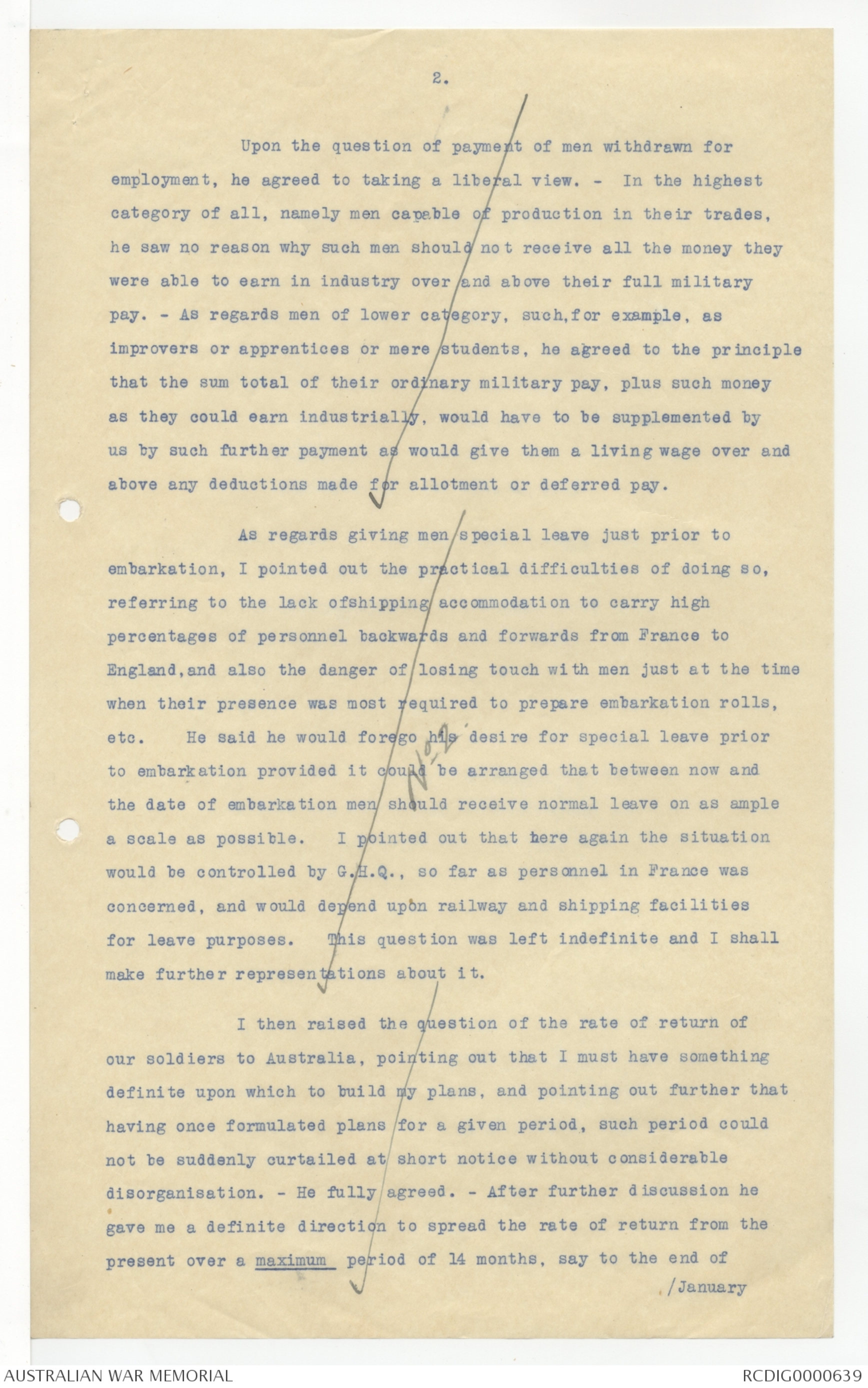
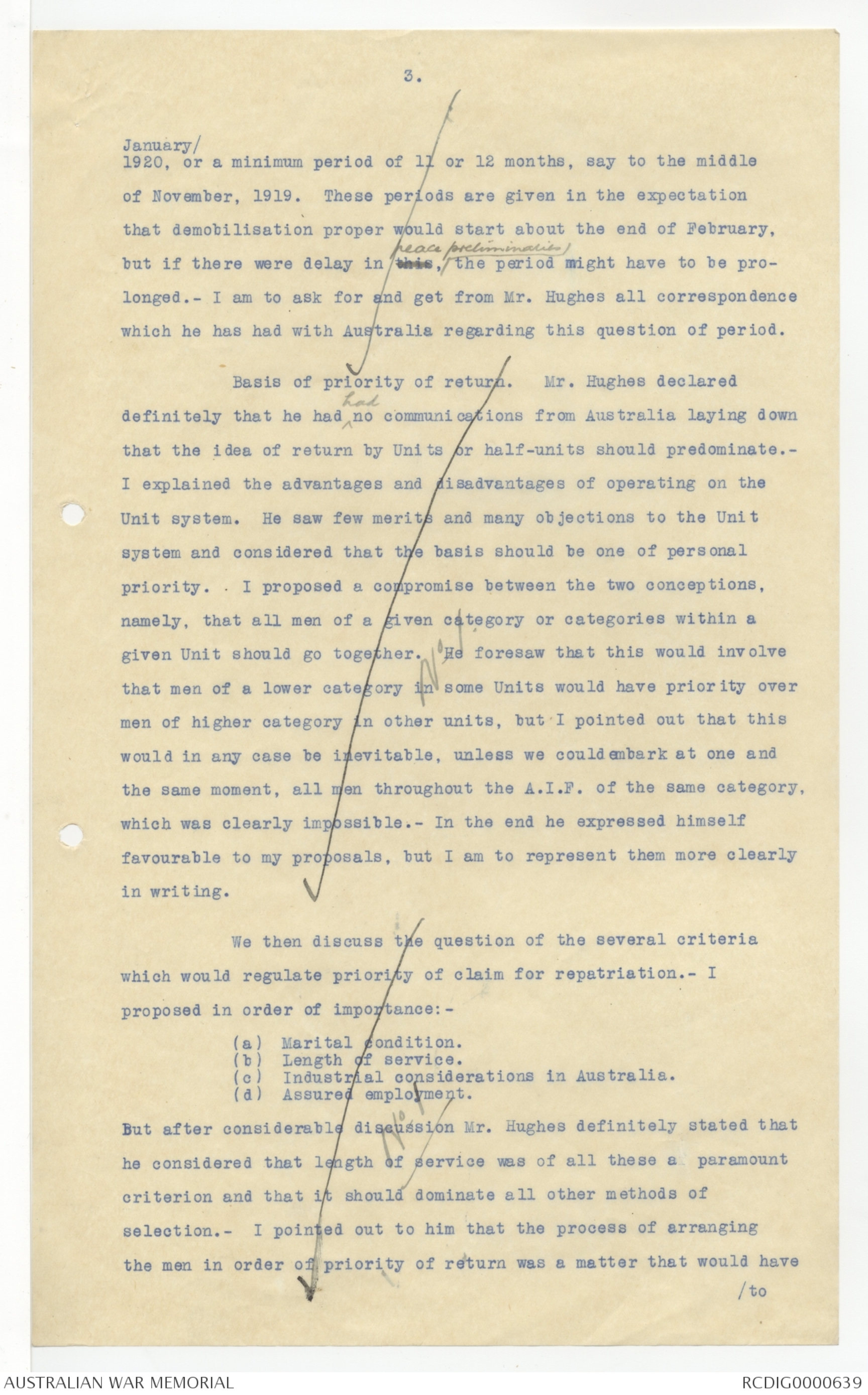
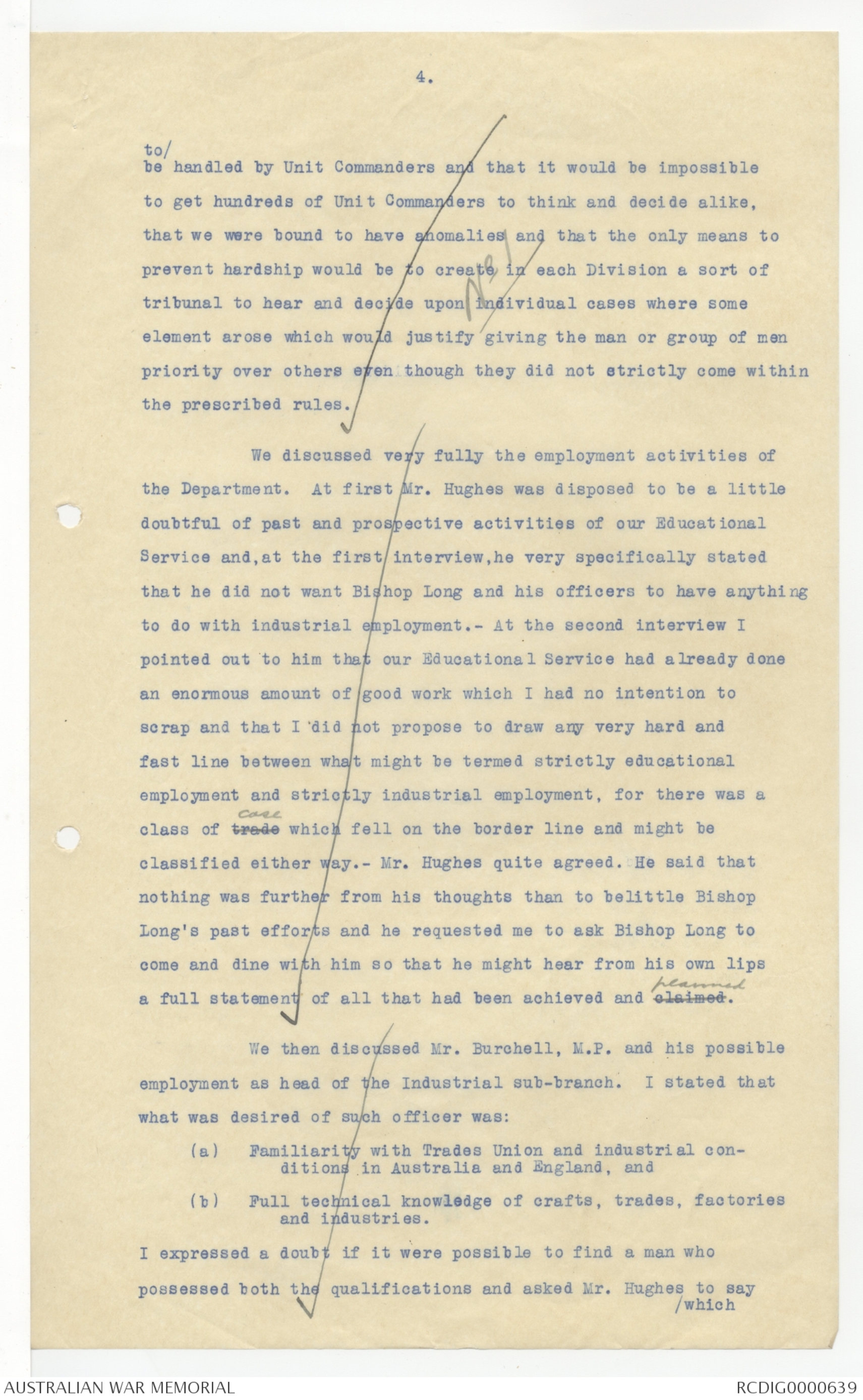
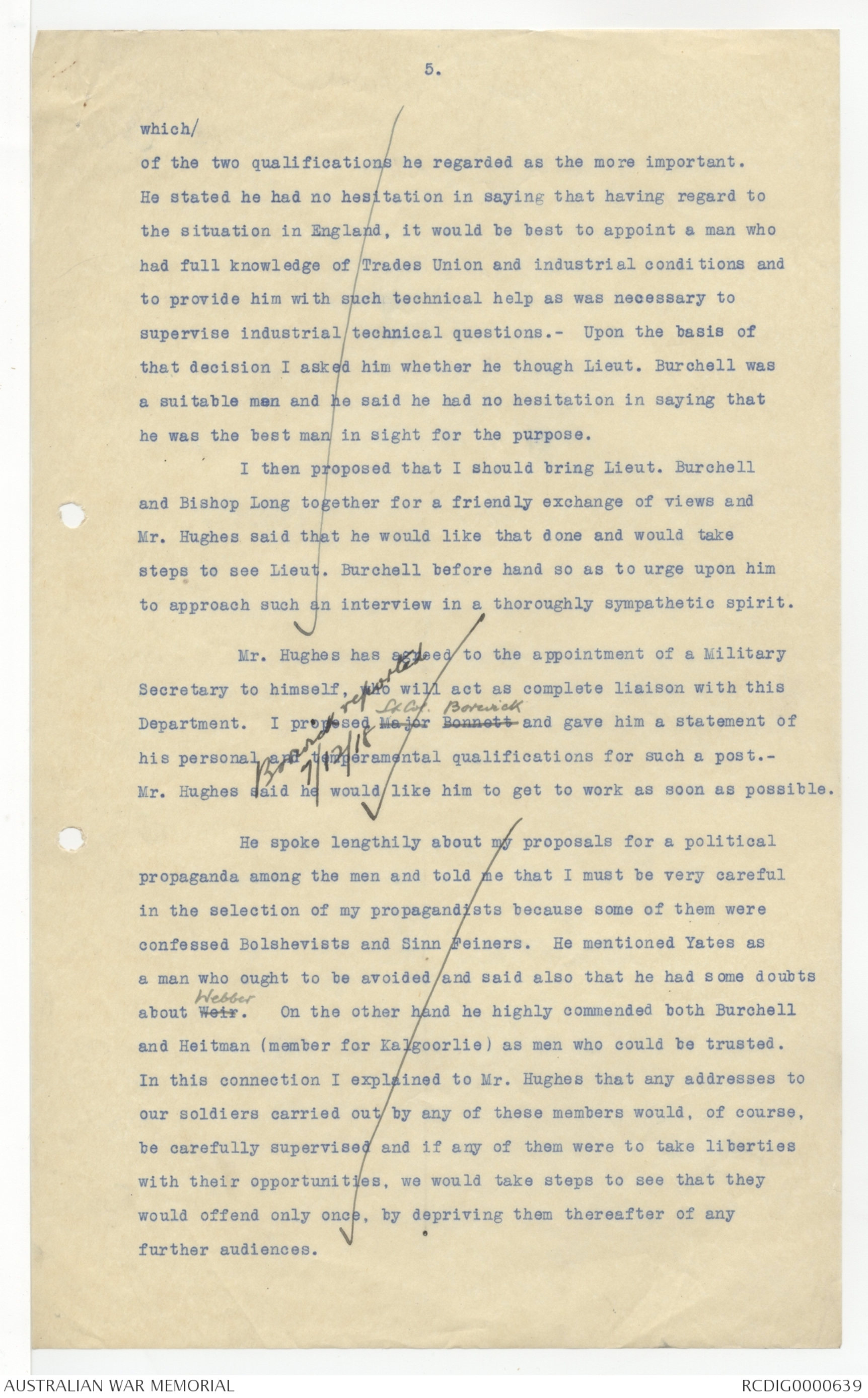
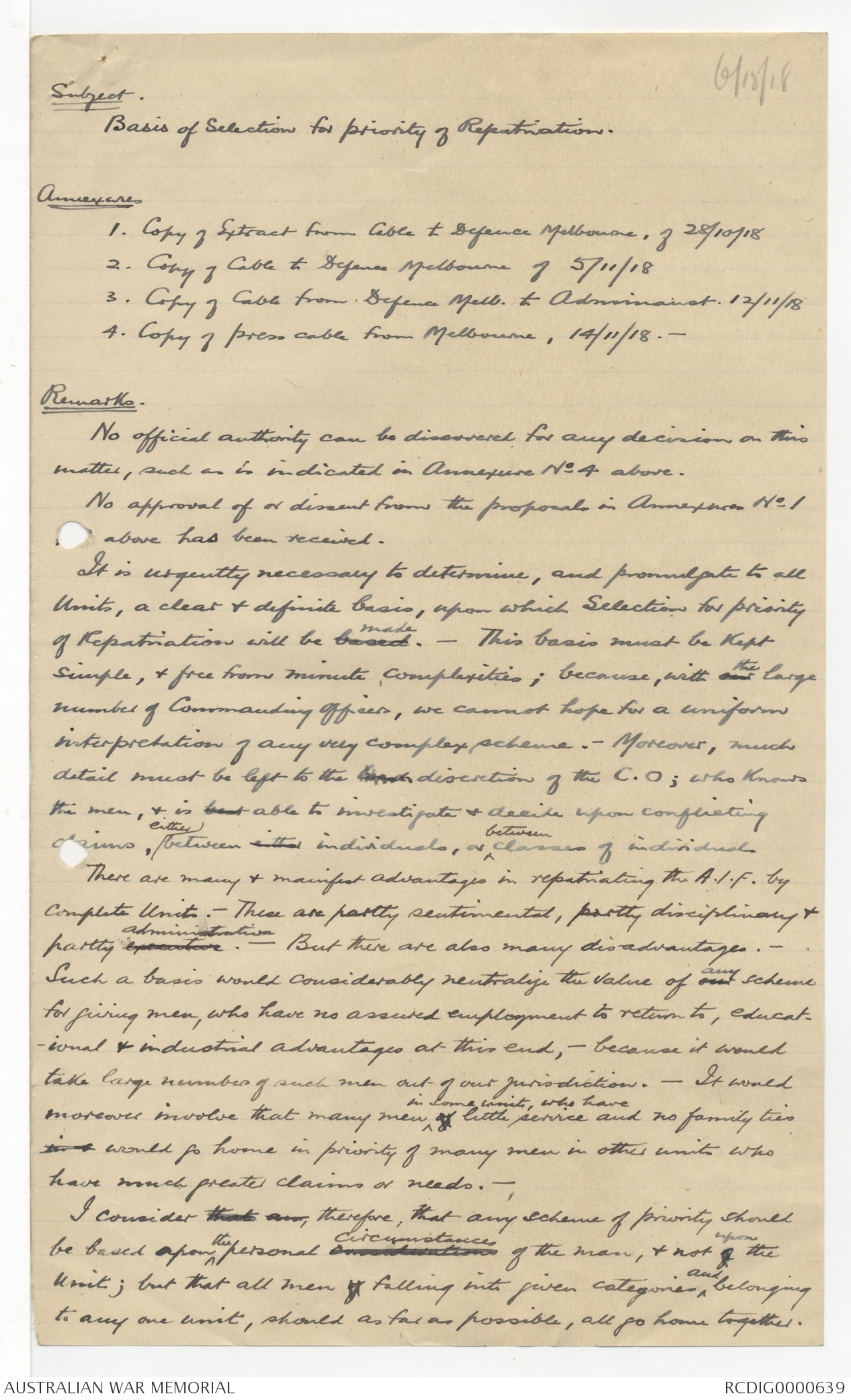
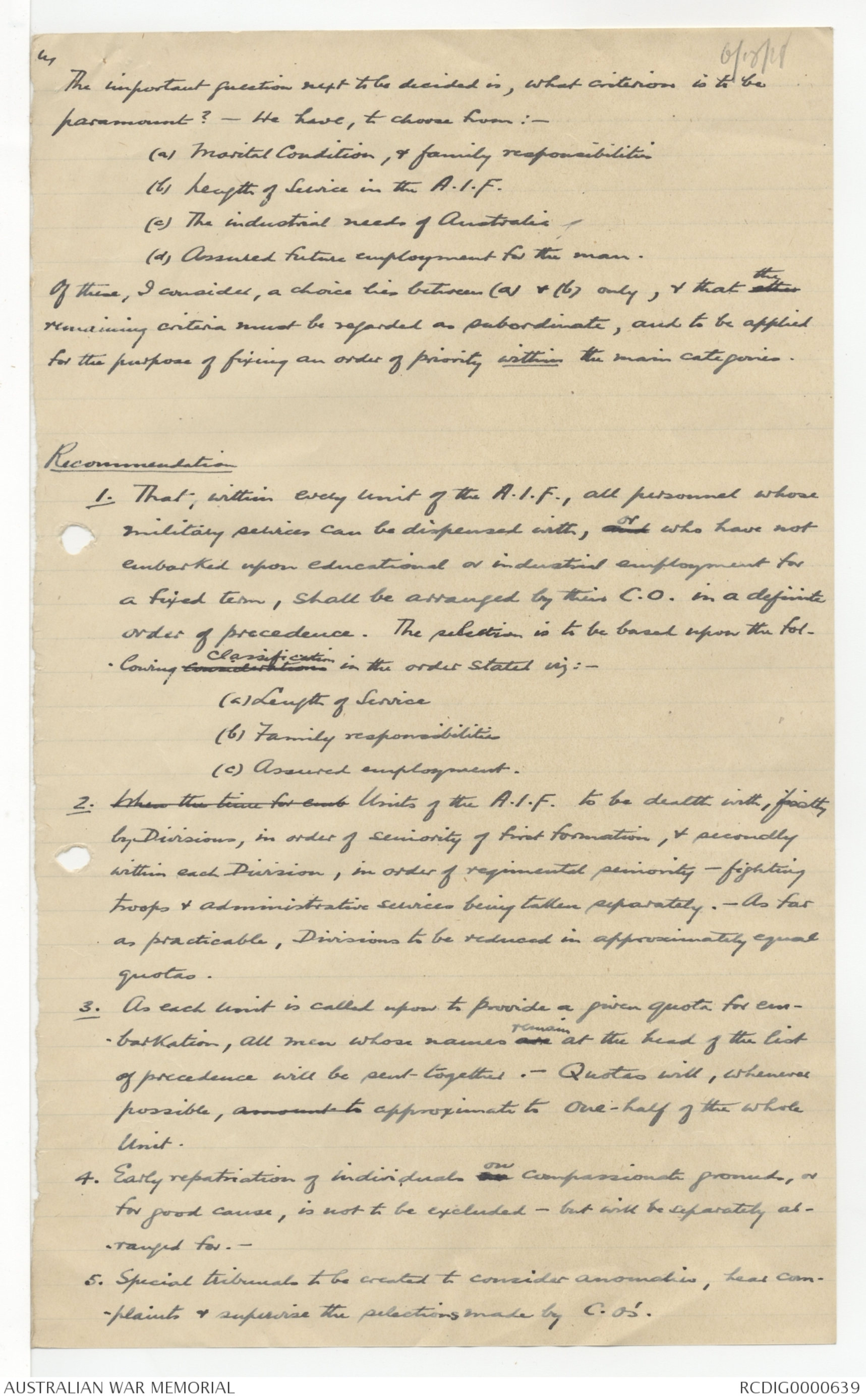
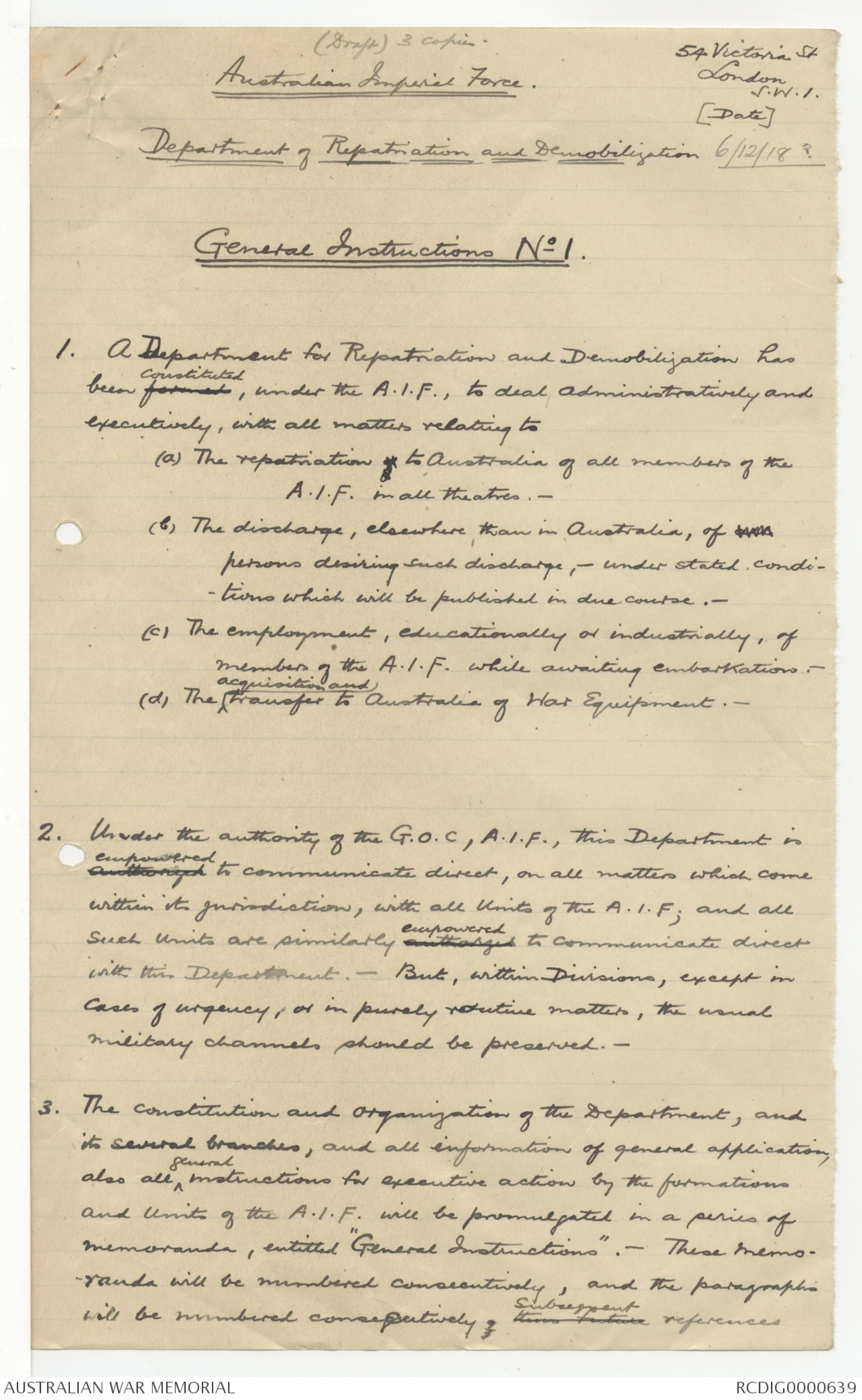
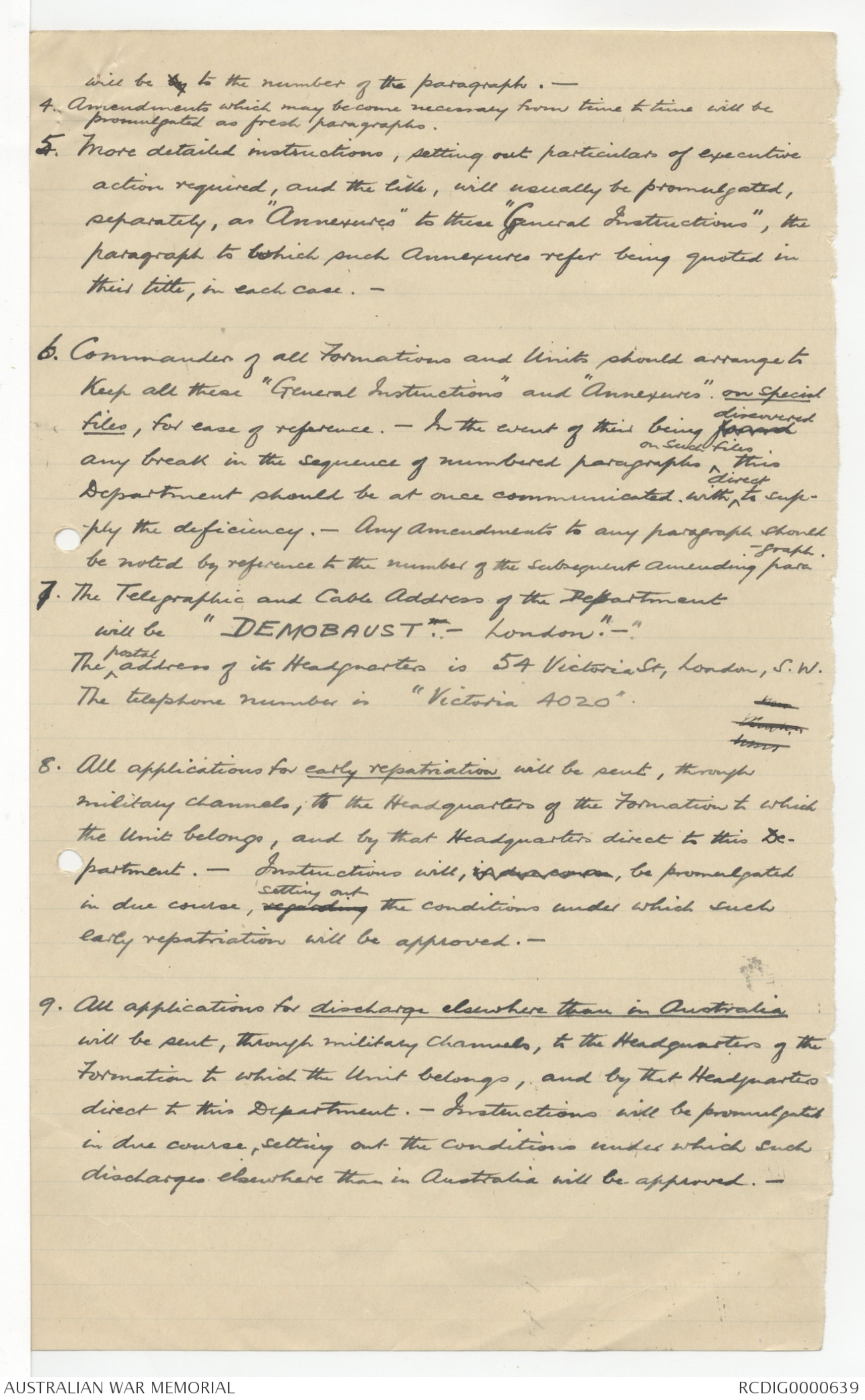
5/12/18
R
NOTES OF INTERVIEWS WITH PRIME MINISTER ON THE 3rd and 4th DECEMBER, '18.
Use of term "Repatriation".Seeing that the Prime
Minister represents both Defence and Repatriation Departments, he not only approves but insists upon the use of this word in the title and activities of this Department.
I promised him in due course a complete report upon the question of what war equipment we should require and transport to Australia.
Authority for official expenditure. He requires something in the nature of a general indication of the directions in which expenditure will have to be incurred, chargeable either to Defence or Repatriation. Pending consideration of formalities, he directs me not to delay executive action in any direction but to incur expenditure at my discretion for the time being.
I promised him a copy of my address to conference of General Officers of the Corps as soon as same is received. [sent per Borwick 7/12/18.]
On the question of making any payment to persons who apply for discharge elsewhere than in Australia, we discussed the advantages and disadvantages of doing so. - He agreed that it would be a fair thing to pay the dischargee in England a sum equivalent to the cost of his voyage, pay during his voyage, food during his voyage and final leave in Australia, but on the other hand he foresaw that the offer of such a sum of ready cash in hand would be a great temptation to men to fabricate reasons for discharge in England, and having received such payment to stow away or in some other way secure
repatriation at Government expense subsequently. - After discussing these points he decided that payment of any such sums in whole or in part ought to be discretionary with the Director-General, who would have to be guided by all the circumstances of the case when deciding whether or not to pay out any cash in hand to such dischargee.
2.
Upon the question of payment of men withdrawn for employment, he agreed to taking a liberal view. - In the highest category of all, namely men capable of production in their trades, he saw no reason why such men should not receive all the money they
were able to earn in industry over and above their full military pay. - As regards men of lower category, such, for example, as improvers or apprentices or mere students, he agreed to the principle that the sum total of their ordinary military pay, plus such money as they could earn industrially, would have to be supplemented by us by such further payment as would give them a living wage over and above any
deductions made for allotment or deferred pay.
As regards giving men special leave just prior to
embarkation, I pointed out the practical difficulties of doing so, referring to the lack of shipping accommodation to carry high percentages of personnel backwards and forwards from France to
England, and also the danger of losing touch with men just at the time when their presence was most required to prepare embarkation rolls, etc. He said he would forego his desire for special leave prior
to embarkation provided it could be arranged that between now and the date of embarkation men should receive normal leave on as ample a scale as possible. I pointed out that here again the situation would be controlled by G.H.Q., so far as personnel in France was concerned, and would depend upon railway and shipping facilities for leave purposes. This question was left indefinite, and I shall make further representations about it.[No 2]
I then raised the question of the rate of return of
our soldiers to Australia, pointing out that I must have something definite upon which to build my plans, and pointing out further that having once formulated plans for a given period, such period could not be suddenly curtailed at short notice without considerable disorganisation. - He fully agreed. - After further discussion he gave me a definite direction to spread the rate of return from the present over a maximum period of 14 months, say to the end of /January
3.
January/
1920, or a minimum period of 11 or 12 months, say to the middle of November, 1919. These periods are given in the expectation that demobilisation proper would start about the end of February, but if there were delay in this ^peace preliminaries, the period might have to be prolonged.- I am to ask for and get from Mr. Hughes all correspondence which he has had with Australia regarding this question of period.
Basis of priority of return. Mr. Hughes declared
definitely that he had ^had no communications from Australia laying down that the idea of return by Units or half-units should predominate.- I explained
the advantages and disadvantages of operating on the Unit system. He saw few merits and many objections to the Unit system and considered that the basis should be one of personal priority. I proposed a compromise between the two conceptions, namely, that all men of a given category or categories within a given Unit should go together. He foresaw that this would involve that men of a lower category in some Units would have priority over men of higher category in other units, but I pointed out that this would in any case be inevitable, unless we could embark at one and the same moment, all men throughout the A.I.F. of the same category, which was clearly impossible.- In the end he expressed himself favourable to my proposals, but I am to represent them more clearly
in writing. [No 1]
We then discuss the question of the several criteria
which would regulate priority of claim for repatriation. - I proposed in order of importance:-
(a) Marital condition.
(b) Length of service.
(c) Industrial considerations in Australia.
(d) Assured employment.
But after considerable discussion Mr. Hughes definitely stated that he considered that length of service was of all these a paramount criterion and that it should dominate all other methods of selection.- I pointed out to him that the process of arranging the men in order of priority of return was a matter that would have /to [No 1]
4.
to/
be handled by Unit Commanders and that it would be impossible to get hundreds of Unit Commanders to think and decide alike, that we were bound to have anomalies and that the only means to prevent hardship would be to create in each Division a sort of tribunal to hear and decide upon individual cases where some element arose which would justify giving the man or group of men priority over others even though they did not strictly come within the prescribed rules. [No 1]
We discussed very fully the employment activities of
the Department. At first Mr. Hughes was disposed to be a little doubtful of past and prospective activities of our Educational Service and, at the first interview, he very specifically stated that he did not want Bishop Long and his officers to have anything to do with industrial employment.- At the second interview I pointed out to him that our Educational Service had already done an enormous amount of good work which I had not intention to scrap and that I did not propose to draw any very hard and
fast line between what might be termed strictly educational employment and strictly industrial employment, for there was a class of trade case which fell on the border line and might be classified either way.- Mr. Hughes quite agreed. He said that
nothing was further from his thoughts than to belittle Bishop Long's past efforts and he requested me to ask Bishop Long to come and dine with him so that he might hear from his own lips a full statement of all that had been achieved and claimed planned.
We then discussed Mr. Burchell, M.P. and his possible employment as head of the Industrial sub-branch. I stated that what was desired of such officer was:
(a) Familiarity with Trades Union and industrial conditions in Australia and England, and
(b) Full technical knowledge of crafts, trades, factories and industries.
I expressed a doubt if it were possible to find a man who possessed both the qualifications and asked Mr. Hughes to say /which
5.
which/
of the two qualifications he regarded as the more important. He stated he had no hesitation in saying that having regard to the situation in England, it would be best to appoint a man who had full knowledge of Trades Union and industrial conditions and to provide him with such technical help as was necessary to supervise industrial technical questions.- Upon the basis of that decision I asked him whether he though Lieut. Burchell was a suitable man and he said he had no hesitation in saying that he was the best man in sight for the purpose.
I then proposed that I should bring Lieut. Burchell
and Bishop Long together for a friendly exchange of views and Mr. Hughes said that he would like that done and would take steps to see Lieut. Burchell before hand so as to urge upon him to approach such an interview in a thoroughly sympathetic spirit.
Mr. Hughes has agreed to the appointment of a Military Secretary to himself, who will act as complete liaison with this Department. I proposed Major Bonnett Lt.Col. Borwick and gave him a statement of his personal temperamental qualifications for such a post.- Mr. Hughes said he would like him to get to work as soon as possible.
[Borwick reported 7/12/18]
He spoke lengthily about my proposals for a political propaganda among the men and tole me that I must be very careful in the selection of my propagandists because some of them were confessed Boshevists and Sinn Feiners. He mentioned Yates as a man who ought to be avoided and said also that he had some doubts about Weir Webber. On the other hand he highly commended both Burchell and Heitman (member for Kalgoorlie) as men who could be trusted. In this connection I explained to Mr. Hughes that any addresses to our
soldiers carried out by any of these members would, of course, be carefully supervised and if any of them were to take liberties with their opportunities, we would take steps to see that they would offend only once, by depriving them thereafter of any further
audiences.
6/12/18
Subject
Basis of Selection for priority of Repatriation.
Annexure
- Copy of Extract from Cable to Defence Melbourne, of 28/1/18
- Copy of Cable to Defence Melbourne of 5/11/18
- Copy of Cable from Defence Melb. to Adminanst. 12/11/18
-
Copy of press cable from Melbourne, 14/11/18.-
Remarks
No official authority can be discovered for any decision on this matter, such as to indicated in Annexure No 4 above.
No approval of or dissent from the proposals in Annexure No 1 as above has been received.
It is urgently necessary to determine, and promulgate to all Units, a clear & definite basis, upon which Selection for priority of Repatriation will be based made. - This basis must be kept simple, & free from minute complexities; because, with our the large number of Commanding Officers, we cannot hope for a uniform interpretation of any very complex scheme.- Moreover, much detail must be left to the xxxxx discretion of the C.O; who knows the men, & is best able to investigate & decide upon conflicting claims, ^either between either individuals, or ^between classes of individuals.
There are many & manifest advantages in repatriating the A.I.F. by complete units.-These are partly sentimental, partly disciplinary & partly expenditure administrative.- But there are also many disadvantages.- Such a basis would considerably neutralize the value of our any scheme for giving men, who have no assured employment to return to, educational & industrial advantages at their end, - because it would take large numbers of such men out of our jurisdiction. - It would moreover involve that many men ^in some units, who have of little service and no family ties in a would go home in priority of many men in other units who have much greater claims or needs.-
I consider that our, therefore, that any scheme of priority should be based upon ^the personal consideration circumstances of the man, & not of ^upon the unit; but that all men of falling into given categories ^and belonging to any one unit, should as far as possible, all go home together.
6/12/18
The important question left to be decided is, what criterion is to be paramount?- We have, to choose from:-
(a) Marital Condition, & family responsibilities
(b) Length of Service in the A.I.F.
(c) The industrial needs of Australia
(d) Assure future employment for the man.
Of these, I consider, a choice lies between (a) & (b) only, & that after the remaining criterion must be regarded as subordinate, and to be applied for the purpose of fixing an order of priority within the main categories.
Recommendation
1. That, within every unit of the A.I.F., all personnel whose military services can be dispensed with, and or who have not embarked upon educational or industrial employment for a fixed term, shall be arranged by their C.O. in a definite order of precedence. The selection is to be based upon the following conditions classification in the order stated viz:-
(a) Length of Service
(b) Family responsibilities
(c) Assured employment.
2. When the time for and Units of the A.I.F. to be dealt with, firstly by Divisions, in order of seniority of first formation, & secondly within each Division, in order of regimental seniority - fighting troops & administrative services being taken separately.-As far as practicable, Divisions to be reduced in approximately equal quotas.
3. As each unit is called upon to prove a given quota for embarkation, all men whose names are remain at the head of the list of precedence will be sent together. - Quotas will, whenever possible, amount to approximate to one-half of the whole Unit.
4. Early repatriation of individuals on on compassionate grounds, or for good cause, is not be excluded - but will be separately arranged for.-
5. Special tribunals to be created to consider anomalies, hear complaints & supervise the selections made by C.O.'s.
(Draft) 3 copies.
54 Victoria St
London
S.W.1
[Date]
6/12/18?
AUSTRALIAN IMPERIAL FORCE.
Department of Repatriation and Demobilization
General Instructions No 1.
- A Department for Repatriation and Demobilization has been
formedconstituted, under the A.I.F., to deal administratively and executively, with all matters relating to
(a) The repatriation of to Australia of all members of the A.I.F. in all theatres.-
(b) The discharge, elsewhere, than in Australia of men persons desiring such discharge, - under stated conditions which will be published in due course.-
(c) The employment, educationally or industrially, of
members of the A.I.F. while awaiting embarkations.-
(d) The ^acquisition and transfer to Australia of War Equipment.-
2. Under the authority of the G.O.C., A.I.F., this Department is authorized empowered to communicate direct, on all matters which come within its jurisdiction, with all Units of the A.I.F; and all such units are similarly authorized empowered to communicate direct with this Department.- But, within Divisions, except in cases of urgency, or in purely routine matters, the usual military channels should be preserved.-
3. The constitution and organization of the Department, and its several branches, and all information of general application, also all ^general instructions for executive action by the formations and Units of the A.I.F. will be promulgated in a series of memorandum, entitled "General Instructions".- These memoranda will be numbered consecutively, and the paragraphs will be numbered consecutively then future subsequent references
will be by to the number of the paragraph.-
4. Amendments which may become necessary from time to time will be promulgated as fresh paragraphs.
5. More detailed instructions, setting out particulars of executive action required, and the like, will usually be promulgated, separately, as "Annexures" to these "General Instructions", the paragraph to which such annexures refer being quoted in their title, in each case.-
6. Commanders of all Formations and Units should arrange to keep all these "General Instructions" and "Annexures" on special files, for ease of reference.- In the event of their being found discovered any break in the sequence of numbered paragraphs ^on such files this Department should be at once communicated with ^direct to supply the deficiency.- Any amendments to any paragraph should be noted by reference to the number of the subsequent amending paragraph.
7. The Telegraphic and Cable Address of the Department will be "DEMOBAUST " London".-"
The ^postal address of its Headquarters is 54 Victoria St, London, S.W. The telephone number is "Victoria 4020".
8. All applications for early repatriation will be sent, through military channels, to the Headquarters of the Formation to which the Unit belongs, and by that Headquarters direct to this Department.- Instructions will, in due course, be promulgated in due course, regarding setting out the conditions under which such early repatriation will be approved.-
9. All applications for discharge elsewhere than in Australia will be sent, through military channels, to the Headquarters of the Formation to which the Unit belongs, and by that Headquarters direct to this Department.- Instructions will be promulgated
in due course, setting out the conditions under which such discharges elsewhere than in Australia will be approved.-
 Sandy Mudie
Sandy MudieThis transcription item is now locked to you for editing. To release the lock either Save your changes or Cancel.
This lock will be automatically released after 60 minutes of inactivity.